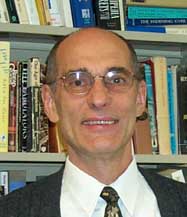 |
||
Lunch at Roc’s with Bruce by John Guzlowski |
||
We sat down and just started talking about the candidate that had been in that morning, and I asked Bruce what it was like when we he first came here in April of 1978. He said he didn’t think much of Charleston at first. Flying into Coles County Airport, he noticed the flatness of East Central Illinois, couldn’t miss it, in fact. He rented a car at the airport and drove into town, past the fields just starting to show green and through a landscape that didn’t have the kind of drama he was used to in New Hampshire. There were no mountains; everything was flat, and the sky seemed too low. He kept thinking, “I don’t want to be buried here.” But that started changing once he got to Charleston. Quivey was the chair, and Bruce sensed he was a nice guy, despite the powder blue polyester suit he wore; and some of the others in the department, people like Vic Bobb, John Simpson, and Jeff Lynch, seemed friendly and maybe even a little bit crazy. Bruce liked that. And what he liked too was the country south of town. At one point during that first visit, he stopped at Gateway Liquors to see what kind of wines they had, and he got to talking with the woman who was working behind the counter. He was remarking on the flatness north of town, and she suggested he take a drive south. He did. He drove down past where he now lives in fact, looking all the while at the trees, the ravines, and the fields opening up in some of those ravines. He knew it would be a good place to live. That was twenty-five years ago, and he still knows it’s a good place to live. He wishes that other people in the department would feel that way too. I asked him if he was going to stay here after he retires, and he said that he would, at least for a while. He had thought about moving, but came to realize that Charleston’s the right place for living. He doesn’t know where it’s likely to go better. He’s got a great house, and the deer hunting is the best anywhere, and especially, there are his friends. I asked him then what kind of plans he had for when he retires, and he told me about the projects he’s been thinking about. He’s already started getting Penyeach Press back up and running. He started this poetry press years ago before he came to Eastern, and he thinks that he’d like to get back to publishing. I asked him what kind of poetry he’d like to publish, and he said that he’s interested in alternating between Illinois poets and poets from outside the state. He also has been working on a series of essays about teaching, about what he’s learned about teaching over the years. One of the essays he’s working on is called “The Daily Quiz.” As I listened to him talking about it, I thought, yes, that’s right, the daily quiz, what a great metaphor for what teaching is like, the things we ask of our students and the things they ask of us, that whole exchange of questions and answers, comments and sentiments that goes on every day in the classroom. I asked him what he thought he would miss most about not teaching. He didn’t hesitate at all. “I like the feeling you get at the start of each semester,” he said. “The sense that you can begin again. Whatever frustrations you had the previous semester are all wiped away. The students are brand new and you’re brand new too.” And he said he wasn’t afraid to say that he would miss being at the center of things in theclassroom, too. There’s some of that in all of us who go into teaching, he feels; but he also said that what keeps people in teaching is the joy they feel when they and their students are learning from each other. He said he would miss that, and he would miss talking about the books he loved, books like War and Peace and the Odyssey. Works like that have become a part of him, like his heartbeat, so personal that sometimes he feels he can’t talk about them; but he knows he has to because this is what he has to give to students, to share with them, this closeness he feels to the people in the books he loves. And maybe that’s the miracle of books that we all want to share, both as teachers and as students. Finally, he said he would miss the students. They stay with you longer than anything else, he said, longer than the poem you published in a little magazine or the essays you delivered at a conference. Knowing the students and teaching them and seeing them grow and develop is the best thing about this business. ••• |
||